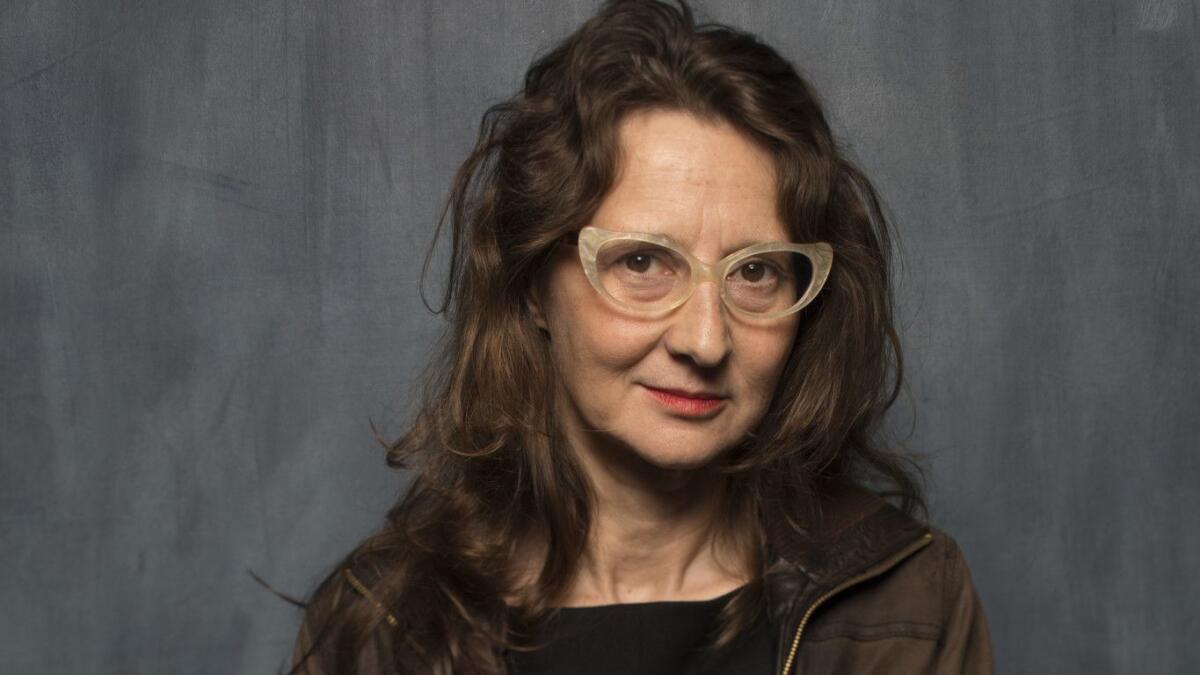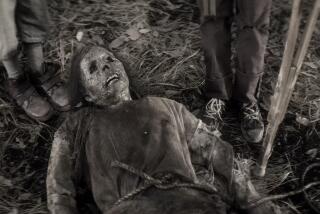Lucrecia Martel fuses the mystical and the historical with bold adventure in ‘Zama’

- Share via
“Zama,” the story of a man waiting to return, has become the vehicle for the long-awaited return of Argentine filmmaker Lucrecia Martel.
The film is a bold, heady work made up of sly humor and revelatory vision. It also marks the first new movie since 2009’s “The Headless Woman” from arguably the most celebrated female filmmaker in Latin America.
An adaptation of the acclaimed novel by Antonio di Benedetto first published in 1956, Martel’s “Zama” follows a functionary of the Spanish crown named Don Diego de Zama (played with droll exasperation by the Mexican actor Daniel Giménez Cacho) who waits in a remote Paraguayan village for a new set of orders to arrive.
Frustrated and confused, he continues to wait, unsure of how to interact with the native people around him and increasingly adrift from his own culture and customs. An adventure story that doesn’t travel very far, “Zama” is a stone-faced satire on masculine privilege and colonial arrogance.
The film’s origins are in the aftermath of Martel’s attempt to adapt the sci-fi graphic novel “The Eternal.” When that project fell apart after years of development, she took a boat trip up the Paraguay River with a lot of books, including “Zama.”
“Immediately when I read it, I knew that I needed to make something in relation to that book,” she said in an interview in Los Angeles via a translator. “I never thought that I could be interested in adapting a book, especially a novel that is considered a masterpiece of Latin American literature. I felt like it was stupid to adapt something like that into cinema.”
What Martel discovered upon reading the book, however, was an unexpected connection.
“I felt like there was a certain affinity between the character of Zama and myself,” the filmmaker, 51, said. “And I felt like this book told a story about the past in a way that I could connect with. When people talk about the story, they always refer to it as a novel about waiting, and I don’t think that’s what affected me about it. It’s also about how you build yourself, and how that’s a necessity and that’s also a trap.
“The human condition of Zama is something that I related very well with. His condition is one in which his life depends on others’ decisions,” Martel added. “That’s a circumstance that we all experience daily. And that for some people might be hell.”
I don’t think it’s a good system for a director to have to go through an illness to finish a movie. I would not recommend that.
— Lucrecia Martel
The movie had its world premiere at the Venice Film Festival last fall before moving on to the Toronto International Film Festival and the New York Film Festival. In a dispatch from the Toronto festival, Times critic Justin Chang praised Martel’s “sly editorial disjunctions, her tactile, off-center compositions and her wild, teeming sonic landscape ... she brings history into an uncomfortably intimate present tense.” When “Zama,” which officially opens in Los Angeles on April 27, was recently released in New York, Vanity Fair’s K. Austin Collins simply declared it “the finest film of 2018 so far.”
As she explained, Martel sees the movie as both a depiction of the past and a disruption of time, creating a disorienting feeling akin to déjà vu for viewers.
“What I took from the novel is the perception of time. And the invisible prison in which the character finds himself,” she said. “Film is an artifact that must at least try to disrupt the perception we have of the world. It’s a way to get close to the past in a different way.”
In her signature cat-eye glasses, Martel has an air of quiet self-possession that comes across on screen in the film’s willingness to be enigmatic, to leave odd moments as inscrutable asides.
“The problem with period movies is that they try to explain things,” she said. “In that effort to explain things, there’s a lot of mistakes made in terms of historical accuracy. The modern day vision feels much more present because of that effort to explain things. If you respect the mystery, that’s the very way into the world.”
Principal photography on the film finished in the fall of 2015 and Martel was a few months into editing when she had to stop working for health reasons early in 2016. (Reportedly cancer, now in remission.) When she returned to work later in 2016 it was with fresh eyes. She had been unhappy with the initial cut of the movie and found herself restoring material she had previously taken out.
“I think the things that happen always reveal something, and I’m sure that it did help,” she said of the break from working on the project. “I don’t think it’s a good system for a director to have to go through an illness to finish a movie. I would not recommend that.”
Having an idea to film a movie every year, is that normal? I think that’s very strange.
— Lucrecia Martel
The character’s own journey in the movie, which includes a dazzling sequence in which his party is ensnared in hunting traps left in a weedy marsh, eventually takes on a sort of resigned calm. In its spaced-out sense of adventure, the film brings to mind movies such as Kelly Reichardt’s “Meek’s Cutoff” or Jim Jarmusch’s “Dead Man.”
“She is so good at evoking memory while still remaining in the present,” said KJ Relth, film programmer at the UCLA Film and Television Archive, which hosted the Los Angeles premiere of “Zama” earlier this month. “The best part of seeing these films in the theater is you have nothing else to do, except focus on these films and how they feel and how they will echo with you later. Phones off, lights down, only focusing on this experience.”
While also comparing Martel to directors such as Sally Potter and Lynne Ramsay for the way in which the formal qualities of her filmmaking become such an integral part of the works’ thematic impact, Relth added, “And that’s why it’s so radical. She is attempting to create a new cinematic language. And I think succeeding.”
Martel next plans to finish a documentary she has been working on for some 10 years on the treatment of indigenous people in the north of Argentina, where she is from. While grateful for the response to “Zama,” she’s reluctant to view the film as her triumphant return to filmmaking. She doesn’t see her work on a specific timeline or trajectory.
“I’m surprised by the idea that there’s a certain time that a filmmaker has between making another film. That’s much more a condition of the market than the desire of making films,” she said. “Having an idea to film a movie every year, is that normal? I think that’s very strange. I think there are too many books, too many films and all of them are too similar in relation to how distinct the world is.”
SIGN UP for the free Indie Focus movies newsletter »
Follow on Twitter: @IndieFocus
More to Read
Only good movies
Get the Indie Focus newsletter, Mark Olsen's weekly guide to the world of cinema.
You may occasionally receive promotional content from the Los Angeles Times.











